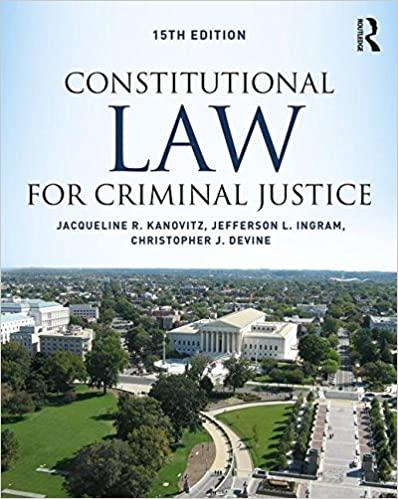Question
Case Problem 8: Family Video Movie Club v. Home Folks, Inc., 827 N.E.2d 582 (Ind. Ct. App. 2005) (p. 359) Home Folks, Inc., operated a
Case Problem 8: Family Video Movie Club v. Home Folks, Inc., 827 N.E.2d 582 (Ind. Ct. App. 2005) (p. 359)
Home Folks, Inc., operated a restaurant on property that it leased from the owner, whose son, Tony Spachtholz, acted as her agent. Family Video Movie Club contacted Spachtholz in 2002 about buying the property for use as a video store. Home Folks' lease ran through 2005. The lease also contained a term that permitted either Home Folks or the landlord to cancel the lease if the property was destroyed.
In mid-2002, Family Video began negotiating with Home Folks about buying out the lease at the same time it was negotiating with Spachtholz about purchasing the property. Late in 2002, Home Folks and Family Video agreed on some terms regarding a buyout, including $35,000 that was to be paid to Home Folks. This was a partial oral agreement that was contingent and incomplete, and both parties knew that it was to be finalized in written form.
On November 25, 2002, Family Video sent a letter to Home Folks' operators, the Misners, outlining the proposed buyout. The letter said the following:
As discussed, Family Video Movie Club, Inc. has entered into a Purchase Agreement to purchase said premises. We have the right to confirm our ability to replat the property, properly zone the property, and perform due diligence.
Until a title has been delivered to us, and in the event we do not purchase said premises, you are obligated to fulfill the terms and conditions of your Lease Agreement with Anthony Spachtholtz [sic]. After closing, you will have ninety days (90) to vacate the premises. At such time that you vacate the premises and deliver possession to Family Video Movie Club, Inc., Family Video Movie Club, Inc. agrees to pay you the full sum of Thirty-five Thousand and 00/100 Dollars, ($35,000.00).
The letter contained a space for the Misners to sign, indicating "I agree with the above terms and conditions." On February 1, 2003, the building housing Home Folks burned to the ground as a result of arson. At this point, the Misners still had not signed the written offer that Family Video had sent to them.
Two days after the fire, the Misners signed the offer letter they had received from Family Video the previous November, indicating that they "agreed with" the terms and conditions of the buyout proposed by Family Video. They signed the offer letter on the advice of their attorney. The next day, February 4, 2003, Home Folks' attorney wrote to Family Video's representative, indicating "we are cancelling the lease, conditioned upon payment of the agreed upon amount." The day after that, February 5, 2003, the Misners wrote Spachtholz to state that Home Folks was canceling the lease.
Home Folks sought payment of the $35,000 from Family Video, but no payment occurred. Home Folks sued Family Video, alleging that a contract was formed and that Family Video should pay Home Folks the $35,000 contemplated by the contract. After a bench trial, the trial court concluded that a contract existed and ordered Family Video to pay Home Folks $35,000 in damages.
Question:
Is the agreement between Family Video Movie Club, Inc. and Home Folks, Inc. governed by the UCC?
Step by Step Solution
There are 3 Steps involved in it
Step: 1

Get Instant Access to Expert-Tailored Solutions
See step-by-step solutions with expert insights and AI powered tools for academic success
Step: 2

Step: 3

Ace Your Homework with AI
Get the answers you need in no time with our AI-driven, step-by-step assistance
Get Started


